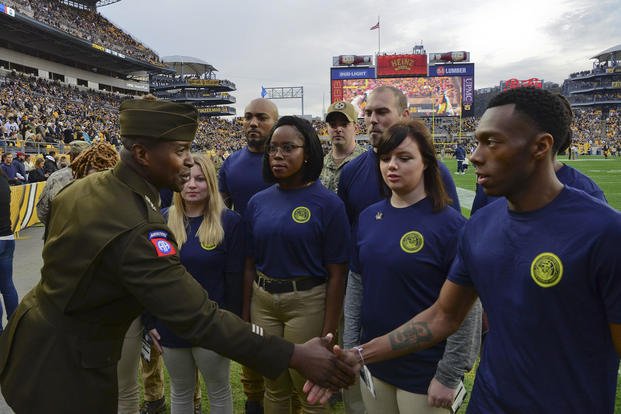Every now and then, this email is received from a young man or woman seeking advice on preparing for military service. This one is a little different as this high school graduate is wondering how to prepare his parents for his desire to serve.
Since many of our readers are future service members and we have many veterans and active-duty members who read these blogs, I thought maybe this article can be used to share some ideas on how you broke the news to your parents when you decided to serve.
Not everyone has supportive parents, period, much less those who are supportive of your decision to serve in the military during times of conflict.
Here is the email:
Stew -- I have been a multisport athlete my whole life, and I am ready to serve my country. However, my family has been really against enlisting and going to the military as an alternative to college, but I am 100% positive that's what I want to do. Both my sister and brother are in college sports, and they expect me to do the same. What kind of tips can you give me to tell them? Thanks for reading, and I hope you can reply. Sincerely, JM
First, good job on the extra effort it takes to be a scholar-athlete with a potential to play at the college level. That requires a good amount of commitment, and you learn a great deal of skills that will transfer over to the military, including teamwork, small unit communications and physical and mental toughness.
But this is a tough one for me to answer alone. With both grandfathers in World War II, my parents were supportive of me joining the military either before or after college, but I had to finish college at some point. I never had any verbal disapproval of my decision to join the military, so I do not know what I would have done personally.
I have had friends that have done a variety of things, such as:
Have a Reasonable Discussion
If they fully understand their situation, most people can explain the pros and cons of joining the military and frame it so there are more pros than cons. Get to know the training pipeline -- boot camp, advanced training, your military occupational specialty (MOS) goals, deployment cycles, etc.
Know where you will be living, how long the training schools last, what your goal profession within the military is and what unit you want to go to. Find out how long and typically where that unit has deployed. Find out what missions they have been involved with to get a better understanding of what you are doing. I am sure your parents will ask these questions.
Be prepared with an answer, if possible. Take your parents to the recruiters office so they know they are part of the process with you.
If it is the "go to college vs. enlisting debate," like many have, I agree with parents on this one. You can grow, mature and get fully prepared, using college facilities for Basic Underwater Demolition/SEAL (BUD/S) or spec ops life. Statistically speaking, many 18- to 20-year-olds quit spec-ops selection programs like BUD/S.
I remember when I first got to BUD/S at age 22 (post college/officer), I thought that there were a lot of young kids at BUD/S -- at least 50% off the street and just out of high school. After Hell Week, we had a handful of teenagers left in our class. So it helps to enter the BUD/S or spec-ops world a little more mature and have a better understanding of what fitness and hard work really are.
The GI Bill is a great tool to get veterans to college during or after their time serving. It is a great way to have resources to pay for college if money is an issue. So pre-college service is an option with many benefits.
Additionally, some enlisting programs will pay off college debt up to a certain amount if you enlist for an additional two years. I knew a guy who had $50,000 college debt paid and BUD/S bonuses with the enlistment term of six years. The first two years of enlistment in the SEAL program is training anyway. Check out the Army Student Loan Repayment Program (SLRP) and the Navy College Loan Repayment Program (CLRP).
It Is a Calling, Not an Alternative to College
You cannot just join the military because you don't want to go to college. Join the military because you want to serve your country, no matter what branch or profession you choose. This is serious, and if you can make your parents understand your desire to serve on that level, you will be better off for it.
Take your fitness just as seriously in your preparation. One day, your fitness level may be the very thing that helps you save your own or someone else's life.
Some Just Do It
Some friends of mine said that if it is a toxic family situation, they told their parents that they joined already. Some have said, "I am 18+ yrs old and I just enlisted. I leave next month."
I do not like this option, as I recommend that you act like an adult and make your parents understand that you have thought this out fully and are fully educated on the process. You know where you will be living once you are in training, post-training and beyond, complete with career goals, etc.
Good luck with your discussions with your family. Check out some of the comments below for even more ideas and personal stories from veterans who were once in your shoes.
You do not have to serve for a full career, but if you do, you can retire with benefits at 38-40 years old if you stay in for 20 years. That's along with immeasurable experience in leadership, logistics, building teams and knowing how to get a job done.
Stew Smith is a former Navy SEAL and fitness author certified as a Strength and Conditioning Specialist (CSCS) with the National Strength and Conditioning Association. Visit his Fitness eBook store if you're looking to start a workout program to create a healthy lifestyle. Send your fitness questions to stew@stewsmith.com.
Want to Learn More About Military Life?
Whether you're thinking of joining the military, looking for fitness and basic training tips, or keeping up with military life and benefits, Military.com has you covered. Subscribe to Military.com to have military news, updates and resources delivered directly to your inbox.


















